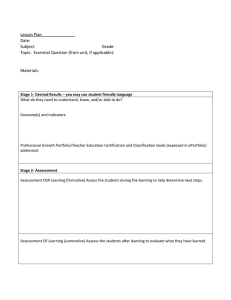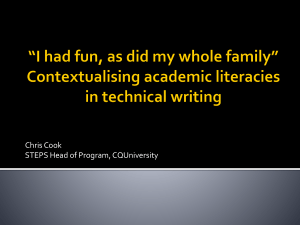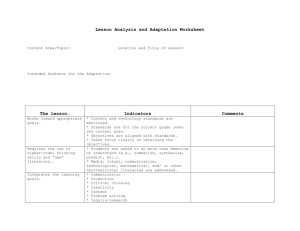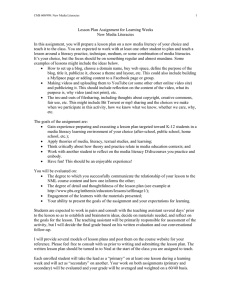CMS.998/CMS.600: New Media Literacies Dr. Alice Robison Lecture Notes
advertisement
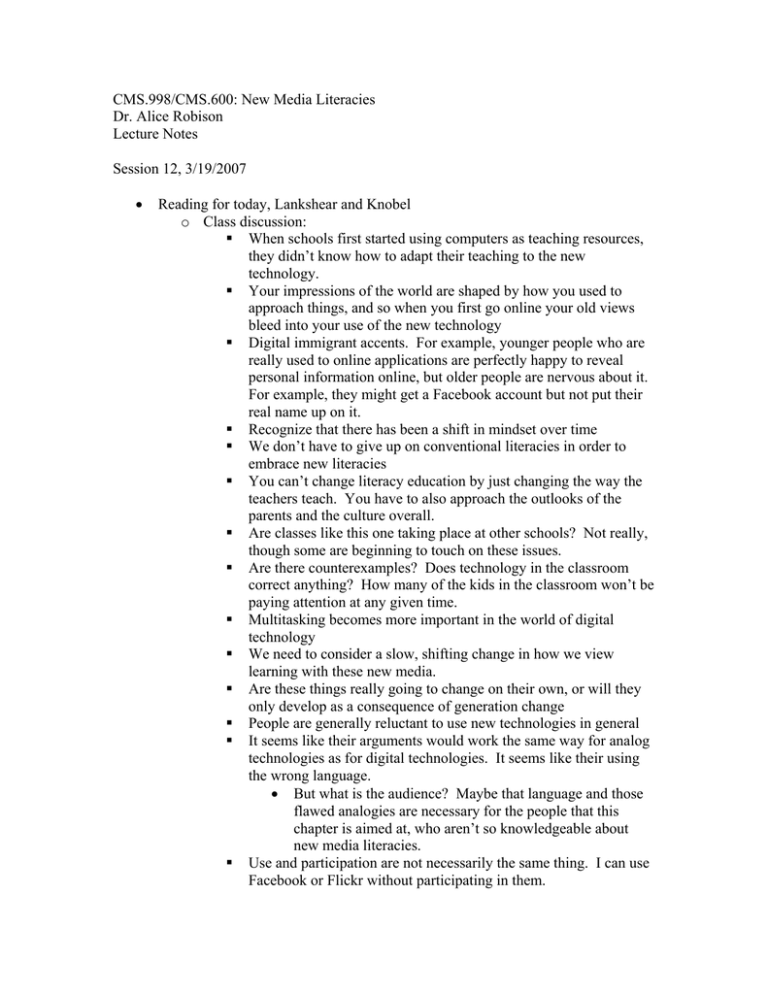
CMS.998/CMS.600: New Media Literacies Dr. Alice Robison Lecture Notes Session 12, 3/19/2007 • Reading for today, Lankshear and Knobel o Class discussion: When schools first started using computers as teaching resources, they didn’t know how to adapt their teaching to the new technology. Your impressions of the world are shaped by how you used to approach things, and so when you first go online your old views bleed into your use of the new technology Digital immigrant accents. For example, younger people who are really used to online applications are perfectly happy to reveal personal information online, but older people are nervous about it. For example, they might get a Facebook account but not put their real name up on it. Recognize that there has been a shift in mindset over time We don’t have to give up on conventional literacies in order to embrace new literacies You can’t change literacy education by just changing the way the teachers teach. You have to also approach the outlooks of the parents and the culture overall. Are classes like this one taking place at other schools? Not really, though some are beginning to touch on these issues. Are there counterexamples? Does technology in the classroom correct anything? How many of the kids in the classroom won’t be paying attention at any given time. Multitasking becomes more important in the world of digital technology We need to consider a slow, shifting change in how we view learning with these new media. Are these things really going to change on their own, or will they only develop as a consequence of generation change People are generally reluctant to use new technologies in general It seems like their arguments would work the same way for analog technologies as for digital technologies. It seems like their using the wrong language. • But what is the audience? Maybe that language and those flawed analogies are necessary for the people that this chapter is aimed at, who aren’t so knowledgeable about new media literacies. Use and participation are not necessarily the same thing. I can use Facebook or Flickr without participating in them. • There was a lot of fear when Amazon first came about that it was going to destroy brick and mortar bookstores. In fact, it wasn’t an either-or choice. • But it did basically destroy the CD store • Was that a format shift, or a technology shift? • Has digital music destroyed the album? Teachers are just learning from the generation before in an awful lot of ways, without even knowing why the previous generation did things a certain way. Kids are bored by the way we’re teaching them right now. The format isn’t working. Looking at some lesson plans taken from the internet o Think in a group about what mindsets these lesson plans reflect and encourage. Point specifically to how those mindsets are involved. o If you have time, think about how you would revise the lesson plans to better reflect new media literacies. o In your groups, examine the lesson plans from the following URLs: http://www.thirteen.org/edonline/lessons/media/ http://warrensburg.k12.mo.us/webquest/media/index.htm http://www.pbs.org/mythsandheroes/tguide_jason.html http://www.nytimes.com/learning/teachers/lessons/mediastudies.ht ml o Class discussion Group 1: • Warrensburg link o Notice the bullet points (centered incorrectly) o Traditional mindset. You have no way to influence media, it is only a dangerous influence on you o Violence, sex, alcohol, tobacco, paranormal (what did they mean by including the paranormal?) o It’s a unidirectional relationship with media that this lesson plan encourages. o This website is pretty old and not well formatted. It hasn’t been updated since 1999. But it came up very quickly on a Google search, which implies that a lot of people have read it and pointed to it. Group 2: • thirteen.org link o This still seems like it follows the mindset of more old-fashioned media, even though it does have the students create something o The lesson plan basically asks students to make a poster online. It doesn’t really take advantage of the differing aspects of new media. o It should make them really reflect on how these different media have shaped their thoughts. o What are the students learning here? What is the objective? o It looks like a pretty good lesson plan if you look at its goals and then look at how it follows through o However, we might question its choice of goals to begin with: it assumes interpreting information within the old view of media. Group 3 • Pbs link o First phase automation They took a standard lesson plan that probably existed 20 years ago and then just added new technology. You could do the same thing in a library instead of using the internet. o They could have been more interactive in the way they approach the status of myth and folk tales. o The goals are pretty vague, and there’s no connection between these lesson goals and national standards. Quick concluding comments • New York Times link o Some of these looked pretty boring o There’s a lot of information available here o The one about how kids can create their own blogs was really well done
